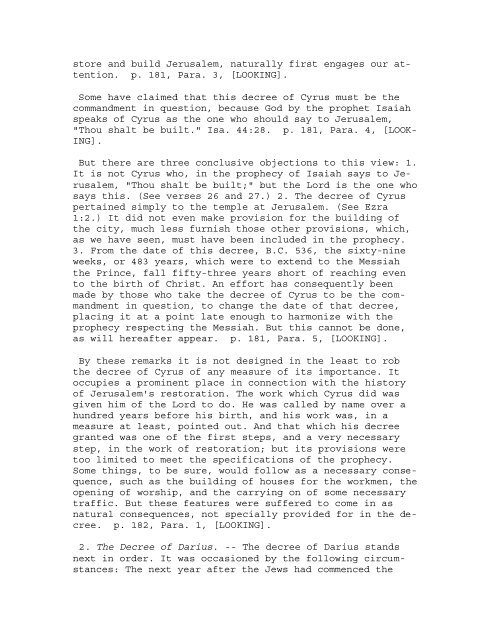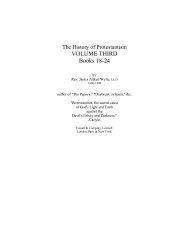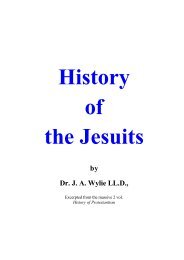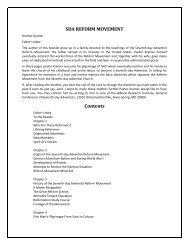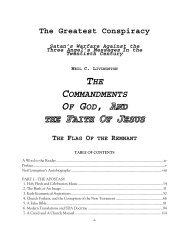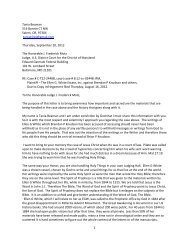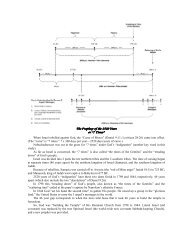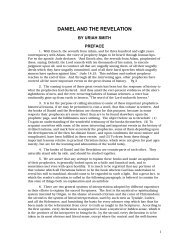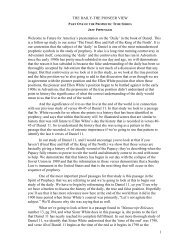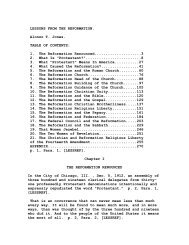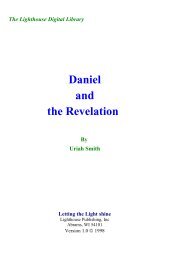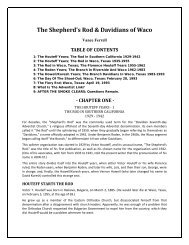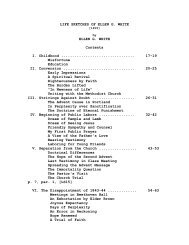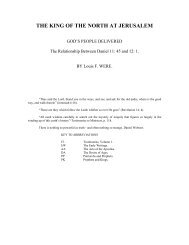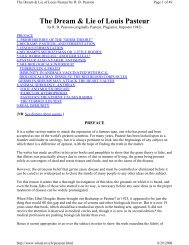LOOKING UNTO JESUS OR CHRIST IN TYPE AND ANTITYPE. BY ...
LOOKING UNTO JESUS OR CHRIST IN TYPE AND ANTITYPE. BY ...
LOOKING UNTO JESUS OR CHRIST IN TYPE AND ANTITYPE. BY ...
You also want an ePaper? Increase the reach of your titles
YUMPU automatically turns print PDFs into web optimized ePapers that Google loves.
store and build Jerusalem, naturally first engages our attention.<br />
p. 181, Para. 3, [<strong>LOOK<strong>IN</strong>G</strong>].<br />
Some have claimed that this decree of Cyrus must be the<br />
commandment in question, because God by the prophet Isaiah<br />
speaks of Cyrus as the one who should say to Jerusalem,<br />
"Thou shalt be built." Isa. 44:28. p. 181, Para. 4, [LOOK-<br />
<strong>IN</strong>G].<br />
But there are three conclusive objections to this view: 1.<br />
It is not Cyrus who, in the prophecy of Isaiah says to Jerusalem,<br />
"Thou shalt be built;" but the Lord is the one who<br />
says this. (See verses 26 and 27.) 2. The decree of Cyrus<br />
pertained simply to the temple at Jerusalem. (See Ezra<br />
1:2.) It did not even make provision for the building of<br />
the city, much less furnish those other provisions, which,<br />
as we have seen, must have been included in the prophecy.<br />
3. From the date of this decree, B.C. 536, the sixty-nine<br />
weeks, or 483 years, which were to extend to the Messiah<br />
the Prince, fall fifty-three years short of reaching even<br />
to the birth of Christ. An effort has consequently been<br />
made by those who take the decree of Cyrus to be the commandment<br />
in question, to change the date of that decree,<br />
placing it at a point late enough to harmonize with the<br />
prophecy respecting the Messiah. But this cannot be done,<br />
as will hereafter appear. p. 181, Para. 5, [<strong>LOOK<strong>IN</strong>G</strong>].<br />
By these remarks it is not designed in the least to rob<br />
the decree of Cyrus of any measure of its importance. It<br />
occupies a prominent place in connection with the history<br />
of Jerusalem's restoration. The work which Cyrus did was<br />
given him of the Lord to do. He was called by name over a<br />
hundred years before his birth, and his work was, in a<br />
measure at least, pointed out. And that which his decree<br />
granted was one of the first steps, and a very necessary<br />
step, in the work of restoration; but its provisions were<br />
too limited to meet the specifications of the prophecy.<br />
Some things, to be sure, would follow as a necessary consequence,<br />
such as the building of houses for the workmen, the<br />
opening of worship, and the carrying on of some necessary<br />
traffic. But these features were suffered to come in as<br />
natural consequences, not specially provided for in the decree.<br />
p. 182, Para. 1, [<strong>LOOK<strong>IN</strong>G</strong>].<br />
2. The Decree of Darius. -- The decree of Darius stands<br />
next in order. It was occasioned by the following circumstances:<br />
The next year after the Jews had commenced the


